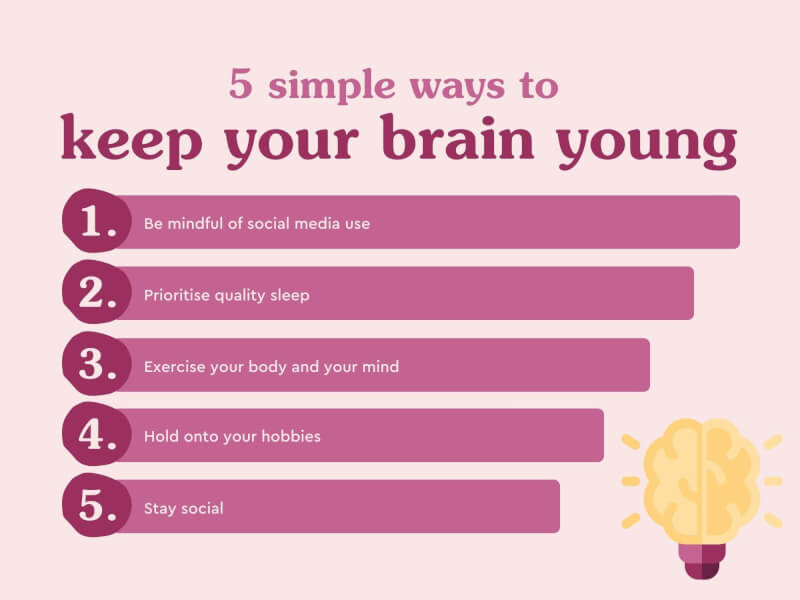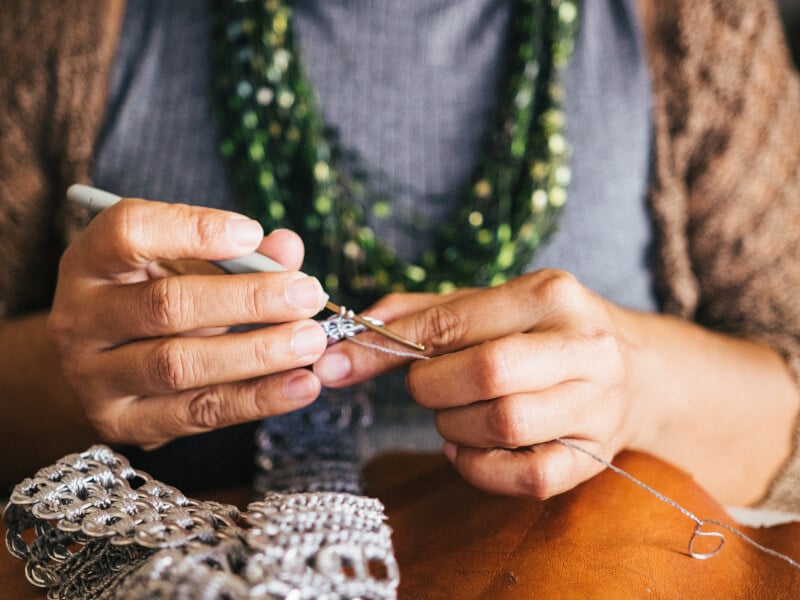In 2025, there are an estimated 421,000 Australians living with dementia, a collection of symptoms that are caused by disorders affecting the brain. According to Dementia Australia, this number is expected to increase to almost 1 million by 2054 – unless we do something about it now.
Too often, discussions around ageing focus on shrinking wrinkles, covering up grey hairs and expensive potions promising eternal youth. But no matter what the beauty buffs of Hollywood tell you, when it comes to ageing, we’ve got bigger fish to fry…
From implementing healthy scrolling habits to picking up your knitting needles, there are plenty of simple things you can do to keep your brain young and reduce your risk of developing dementia – something we’re pretty passionate about here at ClassBento.

Alongside the usual suspects like eating well and exercising, taking time out to get crafty has proven cognitive benefits. In fact, it may even reduce your risk of developing dementia. That’s why it’s our mission to make creative workshops accessible to everyone – to help you switch off, unwind and experience the brain-boosting benefits of creativity. And it’s why we give $1 from every booking to Dementia Australia, to support and empower those impacted.
Whether you’re 27 or 72, actively looking after your brain health is as important as brushing your teeth, and with a few simple tips and tricks, it can become just as easy…
When you’re TikToking through your 20s…

Let’s be real, it’s rare to find a twenty-something without a social media account (or three). Whether it’s dancing on TikTok or scrolling on Instagram, most of us spend a whopping 147 minutes per day on social networking sites. To put things into perspective, that’s the equivalent of watching The Fellowship of The Rings from start to finish. Every. Single. Day. That’s an epic amount of screen time.
But hey, we’re not here to demonise your scrolling habits – we only want to help you build better ones. Truth is, there’s nothing wrong with a little social media deep dive, but here’s the catch: scrolling kills abstraction, the daydreaming state that helps us solve complex problems, experience epiphanies and gain new insights. In fact, it’s estimated that our attention span has shortened by a third in the last 15 years. (If you’re still reading, you’re doing well.)
According to Dr. Fiona Kerr, founder of the NeuroTech Institute and author of The Art & Science of Looking Up, “it certainly feels like we are paying attention” when we’re checking notifications and jumping from app to app but “screens activate different parts of our brain” that ultimately mean more distraction and less abstraction.
We’re all for pinning DIY craft ideas and staying up to date with friends, but it pays to be intentional with your screen time. Up for the challenge? This week, rather than whipping out your phone when you’re waiting for your coffee, keep it firmly in your pocket and give your brain a real break.
When you’re 30 and thriving…
Whether you’re at the peak of your career, you’re finally taking that round-the-world trip or you’ve got three kids under three, now’s the time to put some healthy sleep habits in place. It’s not uncommon for 30-somethings to live by the popular catchphrase ”I’ll sleep when I’m dead” but here’s the unfortunate truth: “There is a recognised association between sleep disruption and cognitive decline and dementia,” says author and general practitioner, Professor Kerryn Phelps, author of How To Keep Your Brain Young: Preserve memory, reduce dementia risk, harness neuroplasticity and restore function.
Depending on your life stage, clocking eight hours of unbroken sleep might seem like a distant dream (hello, newborn baby!) but there are a few things you can do to improve the quality of your nightly snooze.
Avoid:
-
Alcohol – sorry, but your nightcap is doing more harm than good.
-
Caffeine – cut off your supply of cappuccinos when the clock strikes midday.
-
Screens – power down at least two hours before your head hits the pillow.
-
Late meals – don’t let undigested food mess with your circadian rhythm.
Enjoy:
-
A book – reading before bed can improve sleep quality.
-
Dim lights – set the mood and encourage your body to prepare for sleep.
-
A sleep routine – maintain a regular sleep and wake time.
When you're flying through your 40s…

You might not be as nimble as your 20-year-old self, but that doesn’t mean you need to stop moving altogether. According to Dementia Australia, “physical activity increases blood flow to the brain, stimulates the growth of brain cells and the connections between them, and is associated with larger brain volume.” In other words, you can walk, run and cycle your way to a bigger brain! On the other hand, living a sedentary lifestyle can lead to lower brain function, contribute to cognitive decline (think: confusion and memory loss) and increase your risk of developing dementia.
Now that you’re cruising through your 4th decade of life, there’s a good chance you’ve worked out what you like (and dislike) when it comes to moving your body. Cringe at the thought of a morning jog? Try swimming some laps instead. Love the endorphin rush that comes from weight-lifting? Keep pumping iron at every chance you get. Follow the recommendations in the National Physical Activity Guidelines and keep your body moving – it’ll do your brain a world of good.
When you hit half a century…

Endless free time. Unlimited sleep-ins. No office politics or long commutes. It's easy to dream of retirement while you're slogging away at work. But when the time comes to say goodbye, the shift can be destabilising and stressful.
For decades, we've weaved our sense of purpose and identity into the work we do. And no wonder: society rewards productivity and punishes idleness. Employment, on the other hand, gives us a sense of value and makes us feel necessary in some small way.
But deep down, we all know we're more than a job title.
In your 50s, you can anticipate and prepare for this transition by gradually redirecting your sense of purpose into a non-work related hobby. (As they say, one door closes, another door opens.) Now's the time to learn a new language, take up birdwatching, get into gardening or give wheel throwing and grow some new brain while you're at it. According to Dr. Kerr, “under the right conditions we can grow new brain at any stage of our lives. The ways to do this include adequate exercise and sleep, learning new things, eating the right foods to keep our microbiome healthy, and last but not least, direct human interaction.” What brain-boosting hobby will you choose?
Say hello to your 60s – and beyond…

In your sixties and seventies, it’s all about staying social. According to Dementia Australia, “social isolation and loneliness are closely related concepts and have been found to predict premature mortality, depression, cardiovascular disease and cognitive decline.” Thankfully, a 2019 analysis found that a little time with friends goes a long way.
According to research, from the age of sixty and beyond, regular social contact can help protect against dementia. The biggest takeaway? Catch-ups with friends that offer the most cognitive benefits. All the more reason to pop a regular coffee date in your diary or find a group hobby that you love. These crochet and knitting classes are a great place to start may even boost your psychological health and wellbeing.
So there you have it, brainiacs. Keeping your brain healthy isn't rocket neuroscience. By moving regularly, eating well, seeing friends, prioritising quality sleep and taking up a hobby or two, you'll help keep your noggin' fighting fit well into old age. The best part? It’s never too late start.
To discover more about reducing your risk of developing dementia, download Dementia Australia’s Healthy brain, healthy life booklet.





















